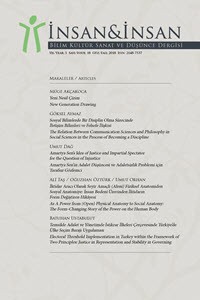Öz
In this study, it has been analyzed Amartya Sen’s idea of justice and his proposal “Impartial Spectator “for the question of injustice. In order understand Sen’s idea of justice, his critique on Rawls’ theory of justice should be considered. Sen’s idea of justice could be read as a critique of Rawls’ theory of justice as well as a suggestion of a new approach instead. For this reason, I will explicate Sen’s idea of justice through his critique on Rawls’ theory of justice. Apart from that, Impartial Spectator is important concept to understand Sen’s idea of justice. Adam Smith proposes the impartial spectator as the standard for moral behaviors in the Theory of Moral Sentiments”. Sen’s takes this notion and use it in the realm of politics for the question of justice. Sen comes up with the idea of “impartial spectator” as a solution for the question of justice in his works.
Anahtar Kelimeler
Justice Impartial Spectator Transcendental institutionalism Social contract Fairness
Kaynakça
- Dağ, Umut, “Amartya Sen’s Idea of Justice and Its Relation with John Rawls and Adam Smith, Master Thesis, Middle East Technical University, 2015.
- Nozick, Robert. “Distributive Justice”, Philosophy Public Affairs. 3/1 (1973): 45-126.
- Rawls, John. A Theory of Justice. London: Belknap Press, 1971.
- Rawls, John. Collected Papers. London: Harvard University Press, 1999.
- Rawls, John. Justice as Fairness: A Restatement. London: Belknap Press, 2001.
- Sen, Amartya. “Adam Smith and The Contemporary World”. Erasmus Journal for Philosophy and Economics. 3/1 (2010): 50-67.
- Sen, Amartya. “Open and Closed Impartiality”. Journal of Philosophy. 99/9 (2002): 445-469.
- Sen, Amartya. The Idea of Justice. London: Belknap Press, 2009.
- Sen, Amartya. “What Do We Want from A Theory of Justice”. Journal of Philosophy. 103/5 (2006): 215-238.
- Smith, Adam. The Theory of Moral Sentiment. Edit., D. D. Raphael. Indiana Polis: Liberty Fund, 1984.
- Voice, Paul. Rawls Explained. Chicago: Open Court Publishing Company, 2011.
Öz
Anahtar Kelimeler
Adalet Tarafsız Gözlemci Aşkınsal kurumsalcılık Toplum sözleşmesi Hakkaniyet
Kaynakça
- Dağ, Umut, “Amartya Sen’s Idea of Justice and Its Relation with John Rawls and Adam Smith, Master Thesis, Middle East Technical University, 2015.
- Nozick, Robert. “Distributive Justice”, Philosophy Public Affairs. 3/1 (1973): 45-126.
- Rawls, John. A Theory of Justice. London: Belknap Press, 1971.
- Rawls, John. Collected Papers. London: Harvard University Press, 1999.
- Rawls, John. Justice as Fairness: A Restatement. London: Belknap Press, 2001.
- Sen, Amartya. “Adam Smith and The Contemporary World”. Erasmus Journal for Philosophy and Economics. 3/1 (2010): 50-67.
- Sen, Amartya. “Open and Closed Impartiality”. Journal of Philosophy. 99/9 (2002): 445-469.
- Sen, Amartya. The Idea of Justice. London: Belknap Press, 2009.
- Sen, Amartya. “What Do We Want from A Theory of Justice”. Journal of Philosophy. 103/5 (2006): 215-238.
- Smith, Adam. The Theory of Moral Sentiment. Edit., D. D. Raphael. Indiana Polis: Liberty Fund, 1984.
- Voice, Paul. Rawls Explained. Chicago: Open Court Publishing Company, 2011.
Ayrıntılar
| Birincil Dil | İngilizce |
|---|---|
| Bölüm | Makaleler |
| Yazarlar | |
| Yayımlanma Tarihi | 10 Ekim 2018 |
| Yayımlandığı Sayı | Yıl 2018 Cilt: 5 Sayı: 18 |
Kaynak Göster
İnsan ve İnsan Dergisi EBSCO, Index Copernicus, ULAKBİM TR Dizin, ERIH PLUS, BASE, DOAJ, OpenAIRE, OAJI, Google Scholar ve Türk Eğitim İndeksi'nde yer almaktadır.


